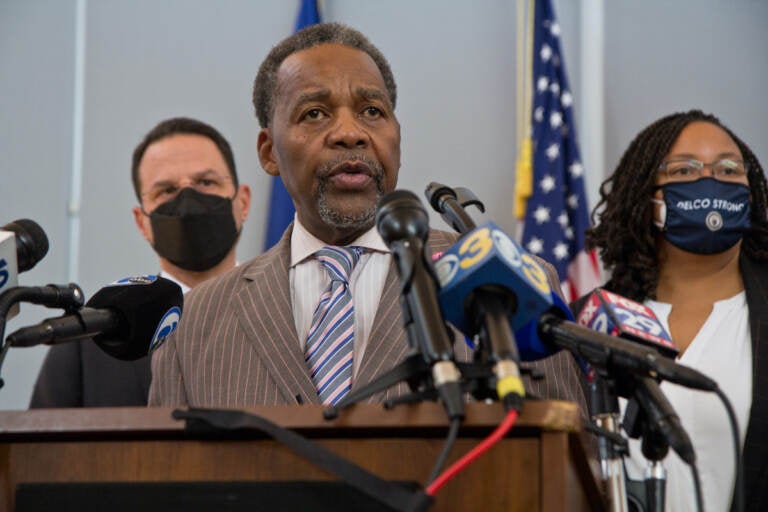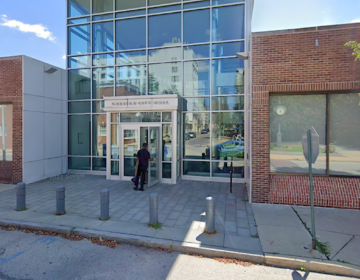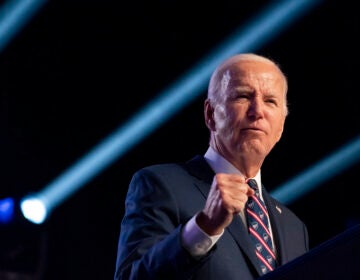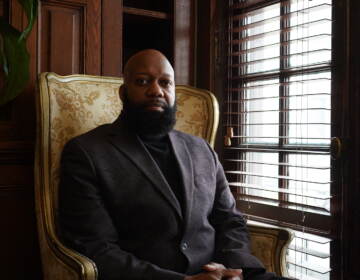Chester parking contract linked to timely campaign donations to Mayor Thaddeus Kirkland
The 2018 parking contract appeared to offer no benefit to the city, but a WHYY analysis of campaign contributions shows the mayor's campaign was likely the one benefitting.

Thaddeus Kirkland, mayor of the city of Chester, Pa. (Kimberly Paynter/WHYY)
In 2018, the city of Chester entered into a parking contract that was lucrative for the contractor, but appeared to offer no benefit to the city.
But a WHYY News analysis of public campaign finance documents shows that someone likely was benefiting: Chester Mayor Thaddeus Kirkland, who has received $15,000 in campaign finance contributions from individuals and entities connected to the parking contractor.
Chester does have the option to terminate the contract, but it comes at a hefty price of $12.1 million — and that’s money that the city on the verge of bankruptcy simply doesn’t have.
The state-appointed receiver tasked with rescuing the city of Chester’s floundering finances, Michael Doweary, first raised serious concerns about the city’s parking contract with Delaware-based PFS VII LLC in January. The contract, he said, was “very one-sided in favor of the parking manager” when compared to industry standards.
While Chester is “not seeing a dime” of parking revenue from the contract, there is a pattern of timely donations from those associated with the company to Mayor Thaddeus Kirkland’s campaigns for both Congress and mayor.
Chester signed the initial parking contract with PFS VII on April 25, 2018, and later amended it on Sept. 5, 2018, to further define project revenues — which made the contract even more lucrative for the parking manager. WHYY News obtained copies of the contracts, which identify PFS VII and Gatso USA Inc. as partners in the deal. Gatso usually works in the business of speed and red light cameras.
Out-of-state contributions stick out
Over several years of Kirkland’s state campaign finance reports, one repeat donor stands out due to his Massachusetts address: Michael Lenza.
According to the city’s parking contract, Lenza is the head of PFS VII as well as Transportation Services Consultants LLC, a consultant of PFS VII.
He gave Kirkland’s mayoral campaign, Friends of Thaddeus Kirkland, $5,000 in 2019 and another $5,000 in 2021, a year in which Kirkland wasn’t even up for re-election. However, Lenza’s generosity didn’t stop at just one Kirkland.
The parking manager donated $500 to the re-election campaign of State Rep. Brian Kirkland, the nephew of the mayor, in October 2018 — weeks after the revised parking agreement was signed with the city as well as another $1,000 in 2022.
Lenza isn’t the only person with an out-of-state address making a sizable donation to Kirkland’s campaigns that coincides with the timing of the contract. A couple of individuals with the last name Dugan, who share a Rhode Island address, gave $2,500 in contributions to Mayor Kirkland’s 2018 Congressional campaign for the seat currently occupied by U.S. Rep. Mary Gay Scanlon.
Richard Dugan was apparently a business partner with Lenza behind TRANSPAY LLC, according to an online database of Massachusetts corporations. Dugan’s donation came with a receipt date of April 5, 2018 — just a few weeks prior to the signing of the initial parking contract with the city.
The Annapolis-based firm Greenwill Consulting Group LLC also contributed a $2,500 donation to Kirkland’s bid for Pennsylvania’s 5th Congressional District with a receipt date of April 11, 2018, which is two weeks before the city signed the contract with PFS VII.
That firm had Gatso USA, a partner in the parking contract, as one of its former clients. Greenwill founder and CEO Ivan Lanier is also the brother of Erwin Lanier, the project manager of the Chester Parking Authority.
Since 2018, Kirkland has received $15,000 in total to his congressional and mayoral campaigns by individuals and entities with ties to the parking contract with PFS VII.
WHYY News reached out to the out-of-state Lenza and Dugan on Monday and Tuesday for comments about their donations to the mayor of a small city in Pennsylvania, but no one responded.
Ivan Lanier did give an interview Tuesday to WHYY News and he said that having been born and raised in the city, he has strong Chester ties and remains really involved. He said that the donation is “just a coincidence. They are totally separate.”
Citing his own investment in the city of Chester, Lanier said that because it’s a small city, he tries to do his best to work with various groups to improve the lives of young people such as funding the revitalization of some Chester athletic fields.
“I donate to many people and if someone is running from the city of Chester and has their best interest at heart, I will support them,” Lanier said.
The spokesperson for the city as well as Mayor Kirkland also did not initially respond to requests on Monday and Tuesday for comment.
The city’s press secretary had previously canceled a scheduled interview for a different story in March and told WHYY News in an email that the mayor would not take part in future interview inquiries.
“Based on our current review we will no longer be conducting interviews with you,” the email read.
Eventually, WHYY News got in contact with the spokesperson on Tuesday, who confirmed that this was still the case.
WHYY News’ attempt to get an interview or a comment from State Rep. Kirkland on Tuesday also went unanswered.
Parking meter fees skyrocket
Kirkland isn’t the only Chester public official to have gotten lucrative opportunities related to the city’s parking contract. In 2018, shortly after Chester’s revised parking contract was signed, city Councilmember Will Morgan got a job as the head of finance and human resources for Upper Marlboro, Maryland, despite living roughly two hours away in Chester and still conducting his duties on Chester City Council.

The town of Upper Marlboro is a client of Greenwill Consulting. Morgan is no longer employed with Upper Marlboro.
WHYY News reached out to Morgan for comment on Monday and Tuesday but did not immediately receive a response. The city spokesperson also acknowledged and declined these requests in a phone call on Tuesday.
From the start, Chester’s parking contract with PFS VII didn’t make much financial sense for the struggling city.
Under the company’s watch, Chester’s hourly parking meter fee exploded to $2.00, higher than Philadelphia and other neighboring suburban municipalities. The cost for expired tickets were also found by the receiver looking into the contract to be “significantly higher” than those areas as well.
The contract with PFS VII calls for the installation of 1,500 parking meters, including 500 on Widener University’s campus.
While Chester is set to receive an “advance” of $1,000,000 at pro-rated intervals as the 1,500 parking meters are installed, the city will only receive 100% of the revenue 10 years after all of the meters are installed.
However, Chester has only received $300,000 of this advance, while PFS VII is raking in all of the parking fees.
This is because only 750 meters have been installed — the rest have yet to be placed into the ground. The parking contract gives the parking manager “unilateral power” to decide when to share revenue.
Because the city has no ability to force the installation of all 1,500 parking meters, the vendor could technically continue to collect 100% of the revenue in perpetuity.
PFS VII is currently the target of litigation from Widener University, which opposes the plan. The university filed a complaint in the Delaware County Court of Common Pleas in 2019. Judge Barry Dozor issued a temporary injunction which stopped the installation of parking meters on the campus.
In Widener University’s answer to a motion to quash in December, the university alleged in court as it attempts to block the contract that Ivan Lanier and Erwin Lanier are related.
The matter is still tied up in court.
WHYY News reached out to Widener University and Chester’s receiver for comment on Tuesday, and both declined to respond.
The receiver took city officials, most notably Kirkland and Morgan, to court in March for interfering with the city’s financial recovery efforts. The petition in the Commonwealth Court of Pennsylvania requested that the city cooperate with orders.
The point of contention centered around elected officials increasing their own salaries at the behest of the receiver as well as two orders that were ignored by city officials.
One had to do with city council passing a resolution that granted an economic development liquor license at a property “partially owned” by Chester’s business development director, who happens to be the ex-son-in-law of Kirkland.
The second order dealt with Morgan’s performance as the city’s director of Finance and Human Resources Departments. Among the many incidents cited in the petition to the Commonwealth Court, the receiver’s order zeroed in on a particular incident as a source of worry.
“In December 2021, Councilman Morgan approved reimbursements to himself, and verbally directed a City employee to reimburse him for the purchase of $1,500 in gift cards without sufficient documentation, and to date, has not provided the requested documentation to the Interim CFO,” the legal petition to the court read.
Ethics concerns
WHYY News reached to the Pennsylvania State Ethics Commission about the ethics concerns arising from campaign contributions being linked to a municipal contract.
And while the government body could not address this case specifically or any hypotheticals, Mary Fox, the executive director of the commission, gave a breakdown of the law.
“It contains a number of restrictions and obligations for folks who are public officials and public employees as those terms are defined in the act,” Fox said. “But generally, it would prohibit anyone who is a public official or a public employee from using their office for a private pecuniary gain for themselves, a member of their immediate family, or a business with which they or a member of their immediate family is associated.”
The state Ethics Commission has a lot of duties. One is education. The commission gives an ethics crash course to public officials and employees on the rights and wrongs of conduct. However, the commission also does more hands-on work.
“The Ethics Commission has an investigative arm that conducts investigations and administrative prosecutions into Ethics Act violations,” Fox said.
Kirkland, who was first elected mayor in 2015, was previously a state representative in the area from 1993 to 2016. His financial decisions raised eyebrows while in the state House, too. In 2013, the longtime Democratic lawmaker became the target of a probe at the behest of the Pennsylvania Ethics Commission for potential conflicts of interest and a pattern of state funds being granted to people with close ties to Kirkland.
Ultimately, the state Ethics Commission issued a decision in 2014 that concluded that no violations occurred “when Legislative Initiative Grants for entities associated with Kirkland and/or members of Kirkland’s immediate family were sponsored/recommended for funding through Kirkland’s legislative office between December 19, 2007, and November 30, 2009.”
However, the commission found that Kirkland did commit one violation of the state’s Ethic Act when a Legislative Initiative Grant for an entity associated with Kirkland’s daughter “was recommended for funding through Kirkland’s legislative office.” His daughter was paid $2,000 for “services rendered” to the Across Colors Cultural Committee.
The Ethics Commission subsequently directed Kirkland to pay $2,000 back to the state.
WHYY is your source for fact-based, in-depth journalism and information. As a nonprofit organization, we rely on financial support from readers like you. Please give today.








